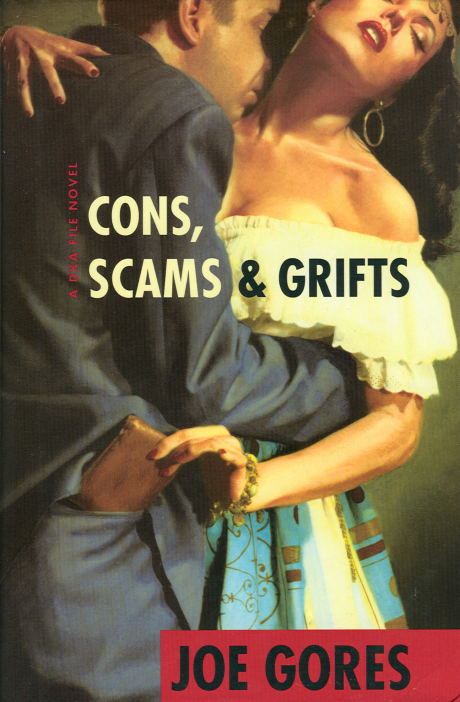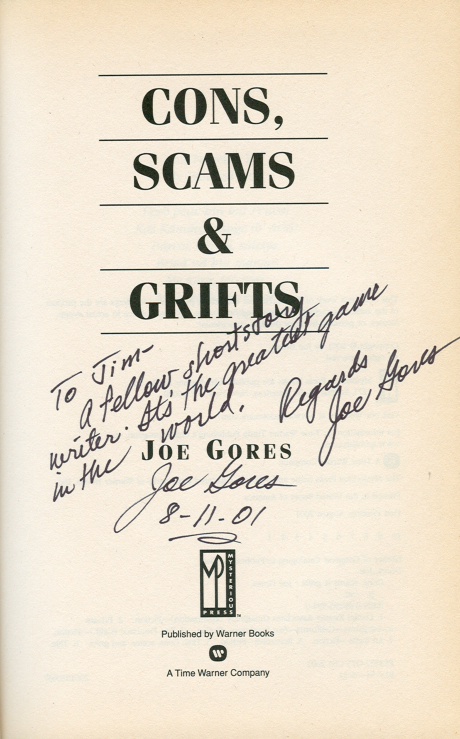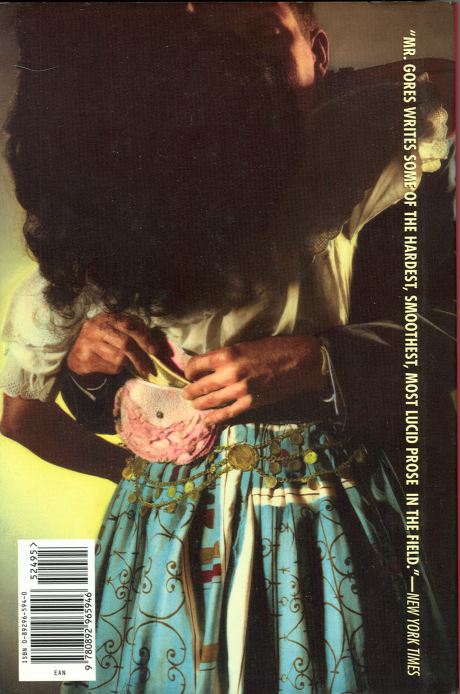Monday, January 17: The Scribbler
THAT REPO LOT IN THE SKY
by James Lincoln Warren
It’s been a rough week for lovers of mysteries. First, there was the unwelcome news that The Mystery Bookstore in Westwood Village, a scant two miles from my home and the store where I used to work, is closing its doors forever at the end of the month. It’s the end of an era for independent mystery bookstores in Los Angeles. Then on Friday, Steve wrote about the passing of beloved editor Ruth Cavin. But the saddest news of all, at least for me, was the news of the death of one of my heroes, Joe Gores, as noted by Rob Lopresti in the comments section to Steve’s post.
I had suspected that Joe was in poor health when he failed to appear at Bouchercon San Francisco last year, because I had seen him at the Las Vegas and Chicago conventions in previous years, and San Francisco was practically his home town. (He actually lived in San Anselmo, about 15 miles north of the Golden Gate.)
As I said, I remember seeing him at those conventions, walking by himself from panel to panel, nobody seeming to recognize who he was. Well, I certainly recognized him. To me, he was a giant.
I first met Joe at the aforementioned Mystery Bookstore in 2000, when I was assistant manager there. The occasion was not, as you might expect, the publication of one of his books. Instead, it was a book signing event for another author entirely, Robert Crais, who was just kicking off his book tour for his novel, Demolition Angel. Joe just happened to show up because he was in town.
One of the perqs of working at TMB was aprés signings, because we would frequently go out for dinner with the authors who signed there, and so it was on this occasion. Because Joe was there, Sheldon McArthur, my boss, asked Bob Crais if it was OK if Joe joined us for dinner after the signing.
Bob’s reaction was immediate. “Are you kidding? I would be honored. Will Dori be there , too?”
Dori, whom I’ve never met, was Joe’s wife and his muse. Open to the dedication page of any Joe Gores book and you’ll read something along the lines of:
This Novel Is For
My Beloved Dori
Every one of his books was dedicated to Dori. It’s exactly the sort of thing my father would have done for my mother, and it always endeared Joe to me.
Needless to say, conversation that evening was scintillating. One of my favorite memories of all time.
The next time I saw Joe was when he was on a book tour for Cons, Scams, & Grifts, a novel in his DKA Files series and a direct sequel to my personal favorite of all his stories, 32 Cadillacs. (Cons has my favorite jacket design for a crime novel of all time, so I’ve included it today along with the title page with Joe’s inscription.) This time we wouldn’t have dinner because he had a tight schedule, but as I said, I did see him at Bouchercons over the next few years.
The obituary in the Los Angeles Times mentions his best-known work and makes a rather extended point of how his work is readily compared to Dashiell Hammett’s, especially for the novels Hammett and Spade and Archer, which after all are Dashiell Hammett pastiches. (Excellent books both.) I love those stories, but for me, the heart of Joe’s contribution was the DKA Files. These were mostly short stories, with the occasion novel like 32 Cadillacs thrown in when it seemed called for, and they actually represented a whole new approach to hard-boiled detective fiction, that of the private investigator procedural. Police procedurals had been around for years and likewise “lone wolf” hard-boiled P.I. stories, but based on his own experiences as a P.I., Joe was able meld the two into something wonderful and unique.
My Cal Ops series was created in specific emulation of Joe Gores’ DKA Files model. That isn’t to say that the Cal Ops stories are just an imitation of Dennis Kearny and his merry band of repo men and women, any more than, say, Philip Marlowe is an imitation of Sam Spade. (For one thing, Carmine Ferrari and Custer Malone, my two principals, do not do repo work, which is central to the DKA Files.) But without Gores’ example, they would never have been conceived at all.
So I guess Joe missed a payment and his vehicle got taken to that Repo Yard Upstairs. And you know what? That particular model was too valuable for street driving, anyway. Now it’s on a golden highway all its own. Adios, Joe.























Great piece, great book cover. And I agree that 32 Cadillacs was the best. I wish I ahd had a chance to meet the man, other than through his works. Thanks for writing this, James, but… Dennis Kearny? Who he?
Oops! I meant Daniel Kearny, who is the “DK” in “DKA”, which stands for Daniel Kearny Associates. When Joe was a repoman, the agency he worked for was actually called Dave Kikkert Associates.
Joe Gores certainly was a giant of crime fiction. Now that you mention it, it is unfortunate that the Times obit put so much stress on the Hammett stuff without (as I recall) mentioning Joe’s invention of the private eye procedural, an even greater contribution to the form. Obituaries often stress the wrong things: when Maury Chaykin died, I thought the lead should be his magnificent and definitive Nero Wolfe. (I pointed this out to the Times obituarian, who told me she always liked William Conrad in the role. No comment.) At least it’s not as bad as obits for Karl Malden saying he would be best remembered for his American Express commercials.
Well, crud. I didn’t know Chaykin died. He was certainly the best visual Wolfe we have ever had. I’m glad to know he appreciated the part. I just read his obit in the NYT and loved the last paragraph:
“There’s an extraordinary billboard up on Sunset Boulevard right now, with a humongous photograph of my face,” he said, referring to an advertisement for “The Golden Spiders,” the cable movie that would spawn the “Nero Wolfe” series. “I drive by it constantly, back and forth, back and forth.”
I forgot to convey the following anecdote from the dinner eleven years ago with Shelly, Bob, and Joe. (I seem to recall Richard Brewer being present, too.)
Before Joe got his M.A. in English Literature at Stanford, he had applied to Stanford’s M.F.A. program in creative writing, which in those days was lorded over by William Saroyan. He sent examples of his work, but was rejected, Saroyan telling him that his writing was unsuitable because it read “like it was intended to be sold.”
Joe, of course, was rather taken aback by this strange criticism. I guess Saroyan felt that real literature shouldn’t be corrupted by having readers.
Joe Gores was an admirer of Sherlock Holmes and A.C. Doyle (as his autograph suggests!) I love his intro to the 1975 Ballantine edition of “Memoirs of Sherlock Holmes.” And I was just re-reading “Dashiell Hammett, Lost Stories” (pub. by Vince Emery Productions, 2005) with a highly appreciative intro by Gores.